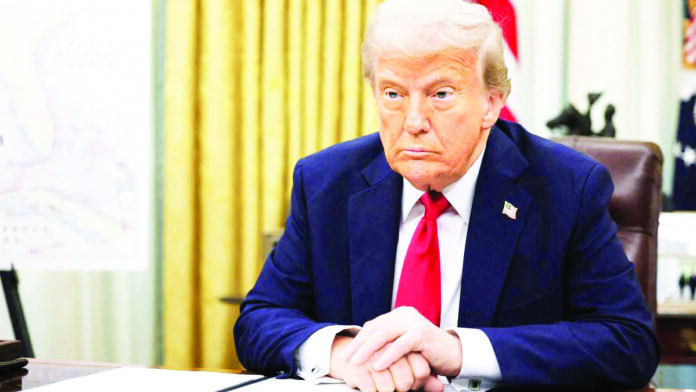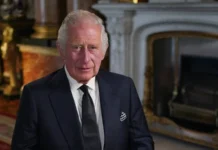Trump’s diplomacy is showing signs of significant shifts in conventional American approach to world affairs.
US President Donald Trump’s unpredictable political behaviour is hugely trending news and views in contemporary world affairs. He can be offensive, erratic, affectionate, lovable, angry or irritable depending upon his mood on the day and what he thinks to be correct or erroneous. Being the most powerful leader of the sole superpower in the world, he considers no other leader from any other country to be equal to him. He does not believe even symbolically in the principle of sovereign equality of nations.
Actually, he became the President of the United States in the backdrop of a spreading narrative about the relative decline of the US and the rise of a new superpower in the East—the People’s Republic of China. He appears to have believed that the wrongs committed by his predecessors were responsible for the declining influence of the United States in world affairs and the growing assertiveness and mounting aspiration of China to replace his country as the supreme global power.
His agenda to “Make America Great Again” or MAGA is thus not an empty slogan. His determination to realise his agenda unfortunately has led to indiscriminate policy changes within the domestic polity and in US engagements with the world culminating in economic, social and strategic disruptions all over. He has been unforgiving to the American people and cannot thus be expected to be kind and nice to other countries.
Significantly, he has been harsh on his allies more than the adversaries, potential or real; and has been literally punishing the neutral developing countries. If Trump could target Canada and Mexico, the EU and Asian allies, such as Japan and South Korea through his tariff threats, he could not have spared the other countries. But then, it is increasingly becoming clear that he is basically trying to make different deals with different countries by skilfully playing the tariff card. The global disruptions in supply chain and trade flows have affected almost all countries, including the United States. But Trump has not budged with the hope that ultimately the US will be the winner. In fact, almost all countries, including India, have come around to negotiate with the Trump Administration on trade and tariff issues.
In order to Make America Great Again, President Trump does not want to spend too much American money in defending other countries. While many of his predecessors demanded defence burden sharing from the NATO allies, it is Trump who has succeeded in nudging them to spend more on defence. Surely, Japan, South Korea, Australia and other allies of the US would do so. This will undoubtedly save US taxpayers’ money or help the US spend that money in military modernization.
President Trump has also sought to curtail spending money abroad in nation-building or humanitarian activities and reduced or eliminated the funding of several schemes and programmes, including that of USAID, Voice of America, and Liberty Free Europe; and even has targeted the National Public Radio.
Trump seems convinced that the American people may suffer for a short time and the economy may get adversely affected for some time, but the country will see a Golden Era in the near future. No one has seen the future, but his policies have already begun to alter the global order and prevailing patterns of international diplomacy. Trump’s policy on the Ukraine War and his approach towards dealing with Russia have culminated in European efforts to acquire strategic autonomy by reducing their dependence on the US.
Trump has refrained from taking any strong step against Russia, despite Moscow’s unwillingness to accept a ceasefire in the Ukraine war without a lasting deal to ensure Russian security and prestige. Trump has not isolated China for long by imposing unimaginable tariff rates and has already made compromises to prevent rupture in Sino-US relations. Trump’s Middle East trip has enabled him to build cooperative ties with Saudi Arabia, Qatar, UAE and, surprisingly, Syria. By skipping Israel in his travel plans, distancing from Tel Aviv’s Gaza operations and renewing negotiations with Iran for a novel nuclear deal, Trump has signalled a foreign policy that is not isolationist. He does not want to embrace Israel and make enmity with the Arab countries. At the same time, he intends Israel and the Arab countries to make peace.
Trump does not want Israel to dictate his policies in the Middle East and that is why his officials directly negotiated with the Hamas for the release of an American hostage; his administration also made a deal with the Houthis to prevent attacks on American shipping, and now is negotiating a deal with Iran for peaceful resolution of the Iranian nuclear issue without resorting to force. It is worth noting how Trump surprised visiting Israeli President Benjamin Netanyahu by announcing a back channel discussion with Iran on the nuclear issue before his meeting with him.
Trump’s diplomacy is showing signs of significant shifts in conventional American approach to world affairs. Like his views on Trans-Atlantic relationship and his evolving Middle East policy, Trump’s approach towards South Asia signals a noticeable swing. It is nowhere better reflected than his administration’s reaction to India-Pakistan three-day military exchange after the Pahalgam terror attack. Trump does not seem to bother about cross-border terrorism, despite formal condemnation of terror attacks on unarmed tourists. He sought to project a neutral approach and called for restraint. For India, it was a case of equating the victim with the aggressor. US Vice President J.D. Vance called for a hands-off policy towards the South Asian conflict. President Trump had no reaction to the Pakistani military attacking civilian targets in India and subsequently he claimed to have mediated a ceasefire agreement between India and Pakistan.
So far, Government of India has handled policy towards the US under Trump 2.0 administration with maturity and elegance. While several countries around the word got flustered after listening to Trump’s frequently fluctuating statements on tariff rates, India projected a composed response. Prime Minister Narendra Modi lost no time to meet President Trump in the White House quite early after his inauguration. He asserted that India has adopted “India First Policy”, which is similar to Trump’s “America First Policy” and emphasised that there was no incongruity in that. India also has successfully engaged in negotiations with the US on trade and tariff issues, which are reportedly progressing well.
When President Trump announced to the world that he mediated an India-Pakistan ceasefire hours before India and Pakistan held DGMO level dialogues, Pakistan promptly heaped praise on President Trump. Pakistani Prime Minister Shehbaz Sharif behaved like a sycophant and apparently acted in haste to be the first one to please the American President. The Modi government made no statement on President Trump’s statement, and thoughtfully and gracefully declared that the Pakistan Army initiated the ceasefire proposal and India positively responded to it. India also pointedly countered the impression that there was any co-relation between tariff and ceasefire dialogues.
By doing so, the Indian government acted in national interest and handled diplomacy deftly amidst numerous confusion arising out of the conflicting statements coming from different capitals. President Trump’s style of diplomacy is distinctive and India has begun to play its card appropriately, as expected from a global player. Trump is intentionally, and not temperamentally, unpredictable, at least on foreign policy matters. He makes fluctuating statements and displays ambivalent policies, including on tariff issues and while negotiating cessation of hostilities in conflict zones. India’s responses are calibrated and well-deliberated statements on foreign affairs.
While the Modi government’s America policy is aimed at promoting and protecting the country’s national interests, it is time for New Delhi to stay alert to unthinkable ways the Trump Administration may shift its attention and policies from time to time, especially related to Pakistan and China.
* Chintamani Mahapatra is the Founder Chairperson of KIIPS and Editor, India Quarterly.







